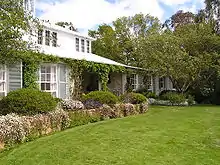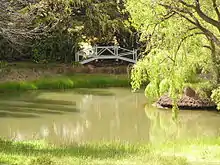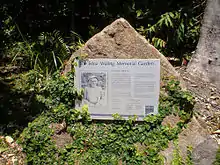Edna Walling
Edna Margaret Walling (4 December 1896 – 8 August 1973) was one of Australia's most influential landscape designers.
Edna Walling | |
|---|---|
| Born | 4 December 1895 |
| Died | August 8, 1973 (aged 77) |
| Nationality | Australian |
| Other names | Margaret |
| Occupation | Garden designer |
| Known for | Garden design, conservation, writer, photographer |
| Partner(s) | Lorna Fielden |




Early years and migration
Walling was born in Yorkshire and grew up in the village of Bickleigh in Devon, England, second daughter of William Walling, a furniture dealer's clerk, and Harriet Margaret, née Goff. Her father encouraged her exploration and love of the English countryside and taught her woodworking. Edna was schooled at the Convent of Notre Dame, Plymouth, Devon. When she was fourteen years old the family emigrated to New Zealand and in 1914 moved with her family to Melbourne, Victoria, Australia where her father had gone in advance in 1911.
Training
With the encouragement of her mother, Walling was awarded her government certificate in horticulture at Burnley College in December 1917, and after some years as a jobbing gardener she commenced her own landscape design practice in the 1920s.[1] Garden construction rather than horticulture interested her most, and she sought work from Melbourne's architects, and secured commissions including several from the fashionable architect Marcus Martin. She "went on to design some significant Arts and Crafts gardens".[2]
Bickleigh Vale
In the 1920s, as Australia's first woman land developer, Walling began to create a village at Mooroolbark on the outskirts of Melbourne called Bickleigh Vale.[3] With its unique collection of charming houses and gardens Bickleigh Vale is one of her most acclaimed achievements.[1] It was designed to be 'the nucleus of an English village' and she built the first cottage, named after the village of Sonning on the River Thames in England, as her own home, though it had to be completely rebuilt after a disastrous fire.[4][5] She sold subdivisions of the land only to people who were prepared to accept designs for a cottage and garden prepared by her.
Garden design
In 1935 Ellis Stones built a wall for her. Recognizing his ability—which she called 'a rare thing this gift for placing stones' – she suggested that he work for her. She gave him a free hand to create walls, outcrops, pools and paths in her gardens at some of Melbourne's finest homes which assisted in establishing a local garden tradition.[6] Their best collaboration was seen in a free-form swimming pool and outcrop, built in 1939-40 for Edith Hughes-Jones at Olinda, Victoria
Her design practice grew and she worked across Australia, in Perth, Hobart, Sydney, and Buderim in Queensland.[7] Her Victorian commissions included designing the lily pond for Coombe Cottage, Dame Nellie Melba's residence in Coldstream, in the Yarra Valley Ranges; Durro[8] l for Mrs Stanley Allen at Mount Macedon (the garden remains though the house was destroyed by fire on July 11, 2018);[9] Rock Lodge garden for Mrs P.F. O'Collins in Frankston; Cruden Farm garden for Mrs Keith Murdoch (later Dame Elisabeth), Langwarrin[10] and the Marshall Garden[11] in Eaglemont. One of her most intact NSW commissions is Markdale, Binda ().
Walling's expertise as an artist enabled her to produce watercolour plans to convey to clients the ambience of the finished gardens she intended to create.[12][13] Her plans from the 1920s and 1930s show a strong architectural framework with 'low stone walls, wide pergolas and paths – always softened with a mantle of greenery'.[14] She later drew inspiration from the Australian bush, creating a more naturalistic style with boulders, rocky outcrops and indigenous plants.[14] In small suburban gardens, Walling created garden 'rooms' to make the garden appear far larger than it actually was.[14]
Her designs were heavily influenced by her experience of the Devon countryside as a child and designers such as Gertrude Jekyll. The houses of American architect Royal Barry Wills (renowned for his Cape Cod designs) and Lewis Mumford’s books, The Culture of Cities and The Image of the City, also provided early inspiration.[15]
Conservationist
In the mid-1940s Walling concentrated her interest in native plants which she had begun using in domestic gardens in the 1920s. In the 1950s, she became interested in the conservation of roadside vegetation and was a prolific writer in the press on the subject as well as her 1952 book The Australian Roadside. According to Trisha Dixon, Walling was an important influence on Australian gardening, steering tastes away from an Anglo-centric heritage towards a respect for the Australian climate and landscape.[16]
In 1967, she moved from Melbourne to Bendles at Buderim in Queensland, where she had hoped to further develop the village concept but it did not progress.[14] Despite her ill-health during her last years at Bendle, Walling continued to write prolifically, rewriting manuscripts, corresponding to newspapers on environmental issues, and trying to republish her books.[14] About a quarter of Walling's designs survive and these are held in the State Library of Victoria and in private collections in Tasmania, South Australia, New South Wales and Victoria.[14]
Writer-photographer
In 1926, Walling began contributing regularly to The Australian Home Beautiful,[17] and by the mid-1930s had become an expert photographer in order to illustrate her articles.[18][19] By the 1950s, Walling had stopped producing her regular column for The Australian Home Beautiful, but continued to write occasional articles for Walkabout,[20][21][22][23][24][25][26][27][28] Woman's World, Australian House and Garden, The Sun News-Pictorial and The Age. She continued to send articles to editors until shortly before her death. The Happiest Days of My Life, covering the development of her holiday property at Lorne, was written by Walling but not published until 2008. She was the author of several books on landscape design, and she and garden writer and botanist Jean Galbraith enjoyed a long correspondence, generating materials for an unpublished manuscript 'The Harvest of a Quiet Eye'.:[29]
- Walling, Edna; Dixon, Trisha, 1953- (1943), Gardens in Australia : their design and care (2nd. facsim. ed.), Bloomings Books, ISBN 978-1-876473-15-0CS1 maint: multiple names: authors list (link)
- Walling, Edna (1947), Cottage and garden in Australia, Oxford University Press, retrieved 30 November 2019
- Walling, Edna (1948), A gardener's log, Oxford University Press, retrieved 30 November 2019
- Walling, Edna (1952), The Australian roadside, Oxford University Press, retrieved 30 November 2019[30]
- Fielden, Lorna; Walling, Edna, 1895-1973 (1947), The gardener's warning, L. Fielden, retrieved 30 November 2019CS1 maint: multiple names: authors list (link)
- Walling, Edna (2008), The happiest days of my life (1st. ed.), Barbara Barnes, ISBN 978-0-646-49075-5
Personal life
Walling never married and called herself a ‘misfit’ or ‘odd’,[5] and as she dressed in a masculine manner and cropped her hair short, male clients were unsure how to react to her.[31][32] Though she had long working association with Eric Hammond and Ellis Stone, her succession of female assistants and close relationships with women including Esmé Johnston[33] and poet Lorna Fielden[34] and friendships with other women who lived openly in a partnership, like bookshop owner Margareta Webber with Dr Jean Littlejohn, and landscape architect Mervyn Davis (her name was Welsh) and Daphne Pearson, have led some researchers to the conclusion that she was lesbian, though Walling herself, who lived through Australia’s more conservative, homophobic cultural period,[35] made no such admission.[5][36][37] A design commission prompted her move to Bendles in Buderim in Queensland 1967, where she was later joined by her companion Lorna Fielden, who had been a teacher at MLC and also edited Walling's writings. Walling died at Nambour on August 8, 1973, and Lorna 4 years later; she and Edna are buried there side by side under two trees.[38]
References
- "Fact Sheet: Bickleigh Vale". Gardening Australia. Australian Broadcasting Corporation. Archived from the original on 7 September 2008. Retrieved 7 September 2008.
- Vale, Anne. "Walling, Edna". Australian Women's Archives Project 2014. Archived from the original on 5 May 2014. Retrieved 5 May 2014.
- "Victorian Heritage Register VHR H2053: Bickleigh Vale". vhd.heritagecouncil.vic.gov.au. Archived from the original on 27 September 2020. Retrieved 30 November 2019.
- "OLD HOME BURNT". The Argus. Melbourne: National Library of Australia. 22 June 1935. p. 26. Retrieved 30 August 2013.
- Sara Hardy (2005), The Unusual Life of Edna WallingPaperback, Allen & Unwin, ISBN 978-1-74114-229-7
- Taylor, Jennifer (1990). Australian Architecture Since 1960. Australian Institute of Architects. ISBN 0455203512.
- Vale, Anne (2009) Exceptional Australian Garden Makers of the 20th Century, PhD thesis, The University of Melbourne: Department of Resource Management and Geography, Melbourne, Victoria
- "Durrol Garden, Mount Macedon, National Trust Statement of Significance". vhd.heritagecouncil.vic.gov.au. Retrieved 30 November 2019.
- D'Agostino, Emma (12 July 2018). "117-year-old weatherboard hill station razed to the ground". Bendigo Advertiser. Archived from the original on 19 August 2018. Retrieved 30 November 2019.
- Cruden Farm, Australian Broadcasting Corporation, 16 February 2008, archived from the original on 24 April 2018, retrieved 30 November 2019
- "Victorian Heritage Database". vhd.heritagecouncil.vic.gov.au. 17 June 2002. Archived from the original on 15 April 2020. Retrieved 18 May 2020.
- Walling, Edna, 1895-1973; Australian Broadcasting Corporation (2001), Edna Walling, Australian Broadcasting Corporation, retrieved 30 November 2019CS1 maint: multiple names: authors list (link)
- Dixon, Trisha; Walling, Edna, 1895-1973; Churchill, Jennie, 1951- (1998), The vision of Edna Walling : garden plans 1920-1951, Bloomings Books, ISBN 978-1-876473-01-3CS1 maint: multiple names: authors list (link)
- Dixon, T., 'Walling, Edna Margaret', in R. Aitken and M. Looker (eds), Oxford Companion to Australian Gardens, South Melbourne, Oxford University Press, 2002, pp. 625–26.
- Watts, Peter (1991). Edna Walling and her gardens (2nd edn). Florilegium. ISBN 0646044664.
- Dixon, T., 'Still on the trail of Edna Walling', Australian Garden History, 22 (1), 2010, pp. 21–22.
- Australian home beautiful, United Press, 1925, retrieved 30 November 2019
- Walling, Edna (1930), [Collection of 600 photographs], archived from the original on 1 February 2021, retrieved 30 November 2019
- "Edna WALLING | Artists | NGV". www.ngv.vic.gov.au. Archived from the original on 2 September 2019. Retrieved 30 November 2019.
- Australian Geographical Society (1 April 1951), "THE FLOWERS OF KOSCIUSKO (1 April 1951)", Walkabout, Australian National Travel Association, 17 (4), ISSN 0043-0064
- Australian Geographical Society (1 May 1963), "Plants that PROTECT (1 May 1963)", Walkabout, Australian National Travel Association, 29 (5), ISSN 0043-0064
- Australian Geographical Society (1 August 1953), "THE TREES OF MAROOCHYDORE (1 August 1953)", Walkabout, Australian National Travel Association, 19 (8), ISSN 0043-0064
- Australian Geographical Society (1 February 1967), "SPARE THE TEA TREES! (1 February 1967)", Walkabout, Australian National Travel Association, 33 (2), ISSN 0043-0064
- Australian Geographical Society (1 May 1968), "WILDFLOWERS IN VICTORIA (1 May 1968)", Walkabout, Australian National Travel Association, 34 (5), ISSN 0043-0064
- Australian Geographical Society (1 September 1950), "KNOW THEM BY THEIR BARKS! (1 September 1950)", Walkabout, Australian National Travel Association, 16 (9), ISSN 0043-0064
- Australian Geographical Society (1 February 1951), "Plants that Border the Great Ocean Road (Victoria) (1 February 1951)", Walkabout, Australian National Travel Association, 17 (2), ISSN 0043-0064
- Australian Geographical Society (1 March 1965), "The Australian Scene FIGS AND PAPERBARKS (1 March 1965)", Walkabout, Australian National Travel Association, 31 (3), ISSN 0043-0064
- Australian Geographical Society (1 September 1968), "VICTORIAN POSIES (1 September 1968)", Walkabout, Australian National Travel Association, 34 (9), ISSN 0043-0064
- Fletcher, Meredith. (2015). Edna Walling, Jean Galbraith, and 'The Harvest of a Quiet Eye'. Australian Garden History, 26(3), 14-17.
- Australian Geographical Society (1 March 1953), "Book Reviews (1 March 1953)", Walkabout, Australian National Travel Association, 19 (3), ISSN 0043-0064
- Peter Watts, Edna Walling and her Gardens, Balmain, Florilegium, 1991, p.17.
- Skene, Judy (1996) 'Gardens of Their Own: Exploring the Garden as Feminine Space' 1996 Conference Proceedings
- Johnston, Esmé (2007), The girl who loved donkeys : a biography of Edna Walling (1st ed.), Barbara Barnes], ISBN 978-0-646-47437-3
- "Fielden, Lorna". www.tantamount.com.au. Archived from the original on 1 February 2021. Retrieved 30 November 2019.
- Robinson, Shirleene (2008), Homophobia : an Australian history, The Federation Press, ISBN 978-1-86287-703-0
- Murdoch, Wayne; ProQuest (Firm) (2017), Kamp Melbourne in the 1920s and '30s : trade, queans and inverts, Newcastle upon Tyne, UK Cambridge Scholars Publishing, ISBN 978-1-5275-0436-3
- Martin, Sylvia. "A Garden of Delights." Hecate's Australian Women's Book Review 17.2 (2005): N_A.
- Burston, Sue (21 October 2017). "Edna Walling" (PDF). Bickleigh Vale Village. Archived (PDF) from the original on 1 April 2020. Retrieved 30 November 2019.
Further reading
- Hardy, Sara (2005), The unusual life of Edna Walling, Allen & Unwin, ISBN 978-1-74114-229-7
- Dixon, Trisha; Walling, Edna, 1895-1973; Churchill, Jennie, 1951- (1998), The vision of Edna Walling : garden plans 1920-1951, Bloomings Books, ISBN 978-1-876473-01-3CS1 maint: multiple names: authors list (link)
External links
- Australian Women biographical entry for Edna Walling
- Edna Walling website produced by Tantamount Productions and the State Library of Victoria for the Australian Broadcasting Corporation (ABC)
- Edna Walling's Manuscript
- Edna Walling entry in The Encyclopedia of Women & Leadership in Twentieth Century Australia